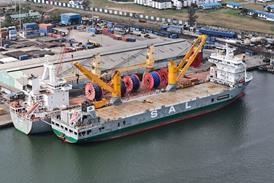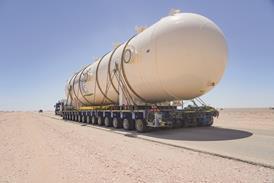September 20 - Sarens has been awarded what it claims is the largest contract in its history by Tengizchevroil (TCO) for its Future Growth Project and Wellhead Pressure Management Project (FGP-WPMP) in Kazakhstan.
TCO - a joint venture between Chevron, ExxonMobil, KazMunay Gas and LukAgro, which operates the Tengiz oilfield - has contracted Sarens to undertake the land transportation and installation of the pre-assembled units (PAU), pre-assembled racks (PAR) and associated oversize equipment for the huge project.
The FGP-WPMP project is being carried out to increase the well pressures and the production capacity of the existing Tengiz refinery. The new plant is being built on a modular basis, with PAUs being manufactured in South Korea and Italy, and PARs fabricated within the Caspian region.
Under the scope of the agreement, Sarens intends to develop and operate two transhipment bases (TSB) - one in Finland and one in Bulgaria - where cargo will be offloaded from ocean-going vessels and loaded onto smaller river vessels for delivery to the site in the Caspian Sea.
Sarens commenced planning and engineering of the transport and lifting activities for this project in 2014.
"The unique scale and challenges of this fascinating project will set a new benchmark for heavy transportation and installation work," said Bev Bentley, project director at Sarens.
For the duration of the project - anticipated to last from 2017 to 2020 - Sarens expects to deploy approximately 150 specialist personnel to the project's various locations, and employ around 50 local logistics professionals.

The Tengiz refinery.
Sarens explained that a single PAU is expected to measure up to 66 m x 16.5 m x 11 m and weigh a maximum of 1,800 tonnes, while the PAR modules will weigh the same but could be wider and taller.
At its various TSBs, Sarens will discharge PAUs from ocean-going ro-ro vessels, utilising up to 92 axle lines of Kamag K25 self-propelled modular transporters (SPMT). The PAUs will then be transported within the TSBs to a storage area and placed on temporary supports until required for delivery to the Kazakh site.
Both TSB locations in Finland and Bulgaria require substantial upgrades to create three ro-ro berths, said Sarens, with one capable of handling ocean-going ro-ro vessels and two for the smaller river vessels.
The infrastructure improvements will include building a number of new quays and hard standings, as well as extending and reinforcing existing quays and installing new mooring dolphins and linkspan bridges.
Construction work at the TSBs is scheduled to commence at the end of this year, with completion planned for the end of 2017, ready to receive the first cargo shipments during early 2018, noted Sarens.
During the operational period, Sarens will be responsible for providing all the necessary port resources including security, stevedoring, warehousing, logistics management, ship movements, tug and pilot operations, as well as supplying office and catering facilities.
Once the site is ready to receive cargoes, the PAUs will be rolled out onto one of a fleet of module carrying vessels (MCV) being custom-built for the project.
HLPFI reported in May and August that Blue Water Shipping had been awarded two huge contracts for the Tengiz project, which will see it provide transport and project management services, as well as oversee the construction of 18 MCVs.

An artist's impression of one of the MCVs for the project.
In order to deliver the PAUs and PARs as close as possible to the Tengix site, a 70 km navigation channel is being dredged through the north section of the Caspian Sea, terminating at a cargo offloading facility (COF) being constructed 4.5 km offshore from Kazakhstan's Prorva Port.
At the COF, Sarens will utilise SPMTs to offload the PAUs arriving from the TSBs and the PARs arriving from the Caspian fabricators. The PARs will be shipped on a mixture of MCVs and barges.
Sarens explained that it is also building and providing 30 m long transition pontoons at two of the three ro-ro berths at the COF, which are necessary to allow ro-ro operations to continue while the water depth fluctuates due to seasonal changes and adverse weather.

An impression of one of the bespoke transition pontoons.
In addition, Sarens will provide two 600-tonne capacity cranes at a lo-lo berth within the COF, which will be used to unload heavy project cargoes not delivered on ro-ro ships.
As soon as the TCO construction team is ready to receive them, the units will be transported 65 km overland on SPMTs to the refinery, where they will be offloaded onto temporary supports.
Some of the PAUs will be stacked on site to create larger modules prior to installation, which will involve the use of Sarens' 3,200-tonne capacity SGC 120 heavy lift crane.
Once assembled, some of the modules will weigh up to 4,200 tonnes and measure over 30 m high. Sarens will then transport the fully assembled modules about 25 km by road using up to 184 axle lines of SPMT and install them directly onto prepared foundations.

Sarens' 3,200-tonne capacity SGC 120 heavy lift crane.
















